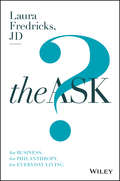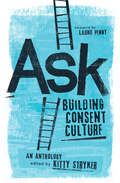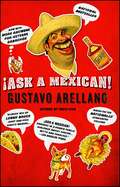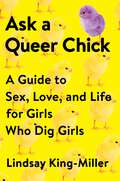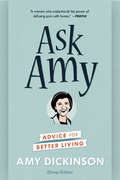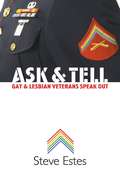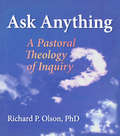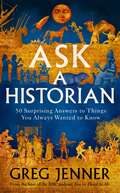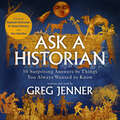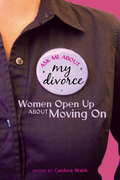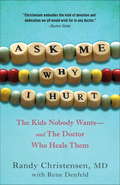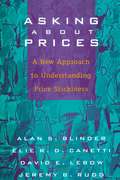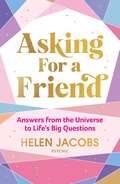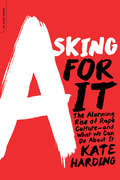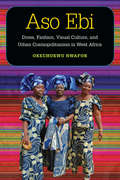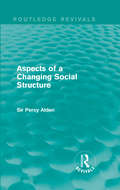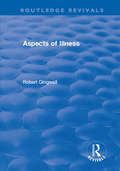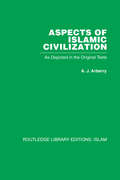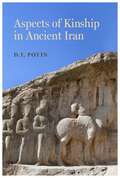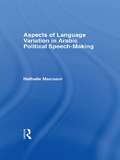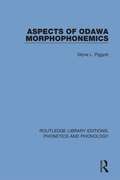- Table View
- List View
The Ask: For Business, For Philanthropy, For Everyday Living
by Laura FredricksAsking is more than a skill—it's a lifestyle The Ask is your personal manual for building the best, most fulfilling personal and professional life possible. Crafting the perfect ask can fund your new business, support your favorite charity, and get more quality time with your significant other—but it can do so much more than that. It can change your life. In learning how to ask for what you really want and deserve, you lose your fear of rejection and judgement. You create the greatest sense of self-worth that no one can give you, you give it to yourself when you ask. The critical moment is when you turn your skills inward and make the hardest asks, the ones you ask yourself. This book is designed to make you an Exceptional Asker, and in the process, give you the confidence and skills you need to achieve all your goals and realize your dreams. You'll learn how to prepare, what words to use, what to avoid, and how to follow up, and you'll purge the natural hesitancy that has been holding you back for so long. Asking is about empowerment. It shows the world that what you want matters. It defines who you are, where you're going, and who will be by your side. This book provides over 175 sample asks, with clear actionable steps to help you claim your space in relationships, at work, and in the world. Rewrite your own rulebook and find empowerment in asking Learn the simple five steps to craft the perfect ask Discover the secret of the ask – it's two sentences and a question Remove your Money Blockers and turn a bad ask into a win Conquer the hardest asks you'll ever make—the ones you ask yourself Mastering the art of the ask reconfigures your approach to life, and changes the way you tackle challenges and goals. The Ask gives you the skills—and the mindset—you need to accomplish anything you can dream.
Ask: Building Consent Culture
by Carol Queen Laurie Penny Kitty StrykerHave you ever heard the phrase "It's easier to ask forgiveness than permission?" Violating consent isn't limited to sexual relationships, and our discussions around consent shouldn't be, either. To resist rape culture, we need a consent culture—and one that is more than just reactionary. Left confined to intimate spaces, consent will atrophy as theory that is never put into practice. The multi-layered power disparities of today's world require a response sensitive to a wide range of lived experiences. In Ask, Kitty Stryker assembles a retinue of writers, journalists, and activists to examine how a cultural politic centered on consent can empower us outside the bedroom, whether it's at the doctor's office, interacting with law enforcement, or calling out financial abuse within radical communities. More than a collection of essays, Ask is a testimony and guide on the role that negated consent plays in our lives, examining how we can take those first steps to reclaim it from institutionalized power.
¡Ask a Mexican!
by Gustavo ArellanoDEAR MEXICAN: WHAT IS ¡ASK A MEXICAN!? Questions and answers about our spiciest Americans. I explore the clichés of lowriders, busboys, and housekeepers; drunks and scoundrels; heroes and celebrities; and most important, millions upon millions of law-abiding, patriotic American citizens and their illegal-immigrant cousins who represent some $600 billion in economic power. WHY SHOULD I READ¡ASK A MEXICAN!? At 37 million strong (or 13 percent of the U. S. population), Latinos have become America's largest minority -- and beaners make up some two-thirds of that number. I confront the bogeymen of racism, xenophobia, and ignorance prompted by such demographic changes through answering questions put to me by readers of my ¡Ask a Mexican! column in California's OC Weekly. I challenge you to find a more entertaining way to immerse yourself in Mexican culture that doesn't involve a taco-and-enchilada combo. OKAY, WHY DO MEXICANS PARK THEIR CARS ON THE FRONT LAWN? Where do you want us to park them? The garage we rent out to a family of five? The backyard where we put up our recently immigrated cousins in tool-shack-cum-homes? The street with the red curbs recently approved by city planners? The driveway covered with construction materials for the latest expansion of la casa? The nearby school parking lot frequented by cholos on the prowl for a new radio? The lawn is the only spot Mexicans can park their cars without fear of break-ins, drunken crashes, or an unfortunate keying. Besides, what do you think protects us from drive-bys? The cops?
Ask a Queer Chick: A Guide to Sex, Love, and Life for Girls Who Dig Girls
by Lindsay King-MillerThis guide to sex, love and life for girls who like girls is useful whether you&’re a lady-dating veteran or still trying to come out to yourself. &“Fresh and authentic…[King-Miller] combine[s] the &‘directness&’ of Dan Savage with the &‘compassion and gentleness&’ of Cheryl Strayed.&”—BITCH magazineSeasoned advice columnist and queer chick Lindsay King Miller cuts through all of the bizarre conditioning imparted by parents, romantic comedies, and The L Word to help queer readers live authentic, safe, happy, sexy lives. With advice on every aspect of life as a lesbian, gay, bisexual, or queer woman—from your first Pride to confronting discrimination in the workplace—there is guidance for some of the most major parts of living in a world that can vacillate between supportive and cruel. &“Lindsay King-Miller is the cool, queer aunt you never had but always wanted—she is unrelentingly kind, totally funny, and no subject is off limits. Ask a Queer Chick is essential reading.&”—Jolie Kerr, author of My Boyfriend Barfed In My Handbag...And Other Things You Can't Ask Martha
Ask Amy
by Amy DickinsonFor a decade, Amy Dickinson has been the Chicago Tribune's signature general advice columnist, helping readers with questions both personal and pressing. Ask Amy: Advice for Better Living is a collection of over 200 question-and-answer columns taken from 2011-2013.As the highly popular successor to the legendary Ann Landers, Dickinson answers readers' questions with care and attention, while also providing a plainspoken, straight-shooting dose of reality that often only comes to us from close friends. Dickinson's advice is rooted in honesty and trust, which is why so many readers turn to her for advice on their everyday lives and for maintaining healthy, lasting relationships. Ask Amy: Advice for Better Living is a testament to the empathetic counsel and practical common-sense tips that Dickinson has been distilling for years.
Ask and Tell
by Steve EstesDon't Ask, Don't Tell" was the directive of President Clinton's 1993 military policy regarding gay and lesbian soldiers. This official silence continued a collective amnesia about the patriotic service and courageous sacrifices of homosexual troops. Ask and Tell recovers these lost voices, offering a rich chronicle of the history of gay and lesbian service in the U.S. military from World War II to the Iraq War. Drawing on more than 50 interviews with gay and lesbian veterans, Steve Estes charts the evolution of policy toward homosexuals in the military over the past 65 years, uncovering the ways that silence about sexuality and military service has affected the identities of gay veterans. These veteran voices--harrowing, heroic, and on the record--reveal the extraordinary stories of ordinary Americans, men and women who simply did their duty and served their country in the face of homophobia, prejudice, and enemy fire. Far from undermining national security, unit cohesion, or troop morale, Estes demonstrates, these veterans strengthened the U.S. military in times of war and peace. He also examines challenges to the ban on homosexual service, placing them in the context of the wider movement for gay rights and gay liberation. Ask and Tell is an important compilation of unheard voices, offering Americans a new understanding of the value of all the men and women who serve and protect them.The official silence mandated by the 1993 "Don't Ask, Don't Tell" policy continued a collective amnesia about the patriotic service and courageous sacrifices of homosexual troops. Ask and Tell recovers these lost voices, offering a rich chronicle of the history of gay and lesbian service in the U.S. military from World War II to the Iraq War. Drawing on more than 50 interviews with gay and lesbian veterans, Steve Estes charts the evolution of policy toward homosexuals in the military over the past 65 years, uncovering the ways that silence about sexuality and military service has affected the identities of gay veterans. These veteran voices--harrowing, heroic, and on the record--reveal the extraordinary stories of ordinary Americans, men and women who simply did their duty and served their country in the face of homophobia, prejudice, and enemy fire. -->
Ask Anything: A Pastoral Theology of Inquiry
by Richard L Dayringer Richard P OlsonKnow how to answer those most-asked questions-by using a scriptural perspectiveThe search for answers remains a valuable catalyst for the growth of personal faith. Ask Anything: A Pastoral Theology of Inquiry provides a fresh approach to answering questions of personal growth, facing problems, and building community. The questions most asked of today&’s pastors and pastoral counselors are answered by integrating psychological with biblical/Christian perspectives. Jesus&’ own questions from scripture are presented as a response to those difficult questions, sparking a self-reflective personal dialogue that illuminates as well as inspires. As each of us journeys through life, urgent questions arise even for the most faithful. Each chapter of Ask Anything: A Pastoral Theology of Inquiry takes parishioners' most-asked questions about the basic issues of life, death, and faith, and connects them with Jesus' questions from scripture, allowing a new depth of introspection and thought. These questions open a free flow of ideas that refreshes personal perspectives and leads to a spiritual resolution for the issue at hand. Jesus' teachings spring to life through the questions from the gospels and the probing thoughts of contemporary authors and scholars, stimulating a productive inner dialogue and positive direction for reflection. Each chapter is carefully referenced and includes helpful exercises and questions for group discussion, counseling conversations, or personal contemplation. Appendixes are included with complete listings of Jesus' questions from the gospels as well as a complete bibliography to facilitate further research.Ask Anything: A Pastoral Theology of Inquiry discusses these questions often asked of pastors: Where do I find meaning in life? How can I succeed? What can I do to protect my children? How can I know which leaders to trust? What can I do about my battle with depression? What can I do about my burnout and fatigue? How can I know God loves me? What is prayer? What happens when I pray? Why is my prayer unanswered? Why is there suffering? Where do I find hope? What happens when I die? What can I do about the pain of grief?Ask Anything: A Pastoral Theology of Inquiry is inspiring, eye-opening reading perfect for pastoral and other Christian counselors, ministers with responsibility for preaching, and any layperson hoping to gather greater insight into Jesus&’ personal answers to their own questions.
Ask Ed: Trash to Stash
by Ed RosenthalDon't trash that stash! Ask Ed: Marijuana Gold-Trash to Stash offers some little-known ways to get more magic out of each and every plant.This book shares some highly efficient and successful methods for transforming leaf or trim, into THC treats, naturally. Rescue unused parts from the garbage safely with equipment from your own kitchen. Ask Ed: Marijuana Gold is conversational in style, explaining each method in down-to-earth language that anyone can understand and follow. Photos clarify the step-by-step instructions, making each method practically foolproof. Plus a special 8-page full-color photo section features vivid examples of the processes and products discussed, giving the reader a point of comparison. Questions and comments from Ask EdTM readers are interspersed throughout the book to supplement the text and offer insider tips. This book quickly pays for itself in the money it saves anyone who uses its recycling recipes.
Ask Ed: Marijuana Gold
by Ed RosenthalDon't trash that stash! Ask Ed: Marijuana Gold-Trash to Stash offers some little-known ways to get more magic out of each and every plant.This book shares some highly efficient and successful methods for transforming leaf or trim, into THC treats, naturally. Rescue unused parts from the garbage safely with equipment from your own kitchen. Ask Ed: Marijuana Gold is conversational in style, explaining each method in down-to-earth language that anyone can understand and follow. Photos clarify the step-by-step instructions, making each method practically foolproof. Plus a special 8-page full-color photo section features vivid examples of the processes and products discussed, giving the reader a point of comparison. Questions and comments from Ask EdTM readers are interspersed throughout the book to supplement the text and offer insider tips. This book quickly pays for itself in the money it saves anyone who uses its recycling recipes.
Ask A Historian: 50 Surprising Answers to Things You Always Wanted to Know
by Greg Jenner'Jenner uses all the questions you never dared to ask about history as an excellent excuse to rummage around in some funny, fascinating, and downright peculiar corners of the past. Every page contains delights, and you will be illuminated and entertained in equal measure.' Lindsey Fitzharris, author of The Butchering Art'If history informs our future, Greg Jenner is one of the best informants out there. He is a natural story-teller, conveying complex ideas and events with pep, verve, and wit. For anyone who regularly asks the question 'Why?', this book is for you.' Susie Dent, author of Word Perfect Why is Italy called Italy? How old is curry? Which people from history would best pull off a casino heist? Who was the richest person of all time? When was the first Monday? What were history's weirdest medical procedures that actually worked? How much horse manure was splattered on the streets of Tudor London? How fast was the medieval Chinese postal system? What did the Flintstones get right about the Stone Age? Who gets to name historical eras, and what will ours be called in 100 years' time? How do we know how people sounded in the past? How old is sign language? In Ask a Historian the author, BBC podcaster, and public historian Greg Jenner provides answers to things you always wondered about, but didn't know who to ask. Responding to 50 genuine questions from the public, Greg whisks you off on an entertaining tour through the ages, revealing the best and most surprising stories, facts, and historical characters from the past. Bouncing through a wide range of subjects - from ancient jokebooks, African empires, and bizarre tales of medicinal cannibalism, to the invention of meringues, mirrors, and menstrual pads - Ask A Historian spans the Stone Age to the Swinging Sixties, and offers up a deliciously amusing and informative smorgasbord of historical curiosities, devoured one morsel at a time.
Ask A Historian: 50 Surprising Answers to Things You Always Wanted to Know
by Greg Jenner'Jenner uses all the questions you never dared to ask about history as an excellent excuse to rummage around in some funny, fascinating, and downright peculiar corners of the past. Every page contains delights, and you will be illuminated and entertained in equal measure.' Lindsey Fitzharris, author of The Butchering Art'If history informs our future, Greg Jenner is one of the best informants out there. He is a natural story-teller, conveying complex ideas and events with pep, verve, and wit. For anyone who regularly asks the question 'Why?', this book is for you.' Susie Dent, author of Word Perfect Why is Italy called Italy? How old is curry? Which people from history would best pull off a casino heist? Who was the richest person of all time? When was the first Monday? What were history's weirdest medical procedures that actually worked? How much horse manure was splattered on the streets of Tudor London? How fast was the medieval Chinese postal system? What did the Flintstones get right about the Stone Age? Who gets to name historical eras, and what will ours be called in 100 years' time? How do we know how people sounded in the past? How old is sign language? In Ask a Historian the author, BBC podcaster, and public historian Greg Jenner provides answers to things you always wondered about, but didn't know who to ask. Responding to 50 genuine questions from the public, Greg whisks you off on an entertaining tour through the ages, revealing the best and most surprising stories, facts, and historical characters from the past. Bouncing through a wide range of subjects - from ancient jokebooks, African empires, and bizarre tales of medicinal cannibalism, to the invention of meringues, mirrors, and menstrual pads - Ask A Historian spans the Stone Age to the Swinging Sixties, and offers up a deliciously amusing and informative smorgasbord of historical curiosities, devoured one morsel at a time.
Ask A Historian: 50 Surprising Answers to Things You Always Wanted to Know
by Greg JennerIf history informs our future, Greg Jenner is one of the best informants out there. He is a natural story-teller, conveying complex ideas and events with pep, verve, and wit. For anyone who regularly asks the question 'Why?', this book is for you.' Susie Dent, author of Word Perfect Why is Italy called Italy? How old is curry? Which people from history would best pull off a casino heist? Who was the richest person of all time? When was the first Monday? What were history's weirdest medical procedures that actually worked? How much horse manure was splattered on the streets of Tudor London? How fast was the medieval Chinese postal system? What did the Flintstones get right about the Stone Age? Who gets to name historical eras, and what will ours be called in 100 years' time? How do we know how people sounded in the past? How old is sign language? In Ask a Historian the author, BBC podcaster, and public historian Greg Jenner provides answers to things you always wondered about, but didn't know who to ask. Responding to 50 genuine questions from the public, Greg whisks you off on an entertaining tour through the ages, revealing the best and most surprising stories, facts, and historical characters from the past. Bouncing through a wide range of subjects - from ancient jokebooks, African empires, and bizarre tales of medicinal cannibalism, to the invention of meringues, mirrors, and menstrual pads - Ask A Historian spans the Stone Age to the Swinging Sixties, and offers up a deliciously amusing and informative smorgasbord of historical curiosities, devoured one morsel at a time.
Ask Me About My Divorce: Women Open Up About Moving On
by Candace WalshIt's time to get past the idea that divorce equals failure. Sure, it may not be what you had in mind when you walked down the aisle, but if it's the escape hatch into a better life, it should be filled with more promise. It can be celebrated.Ask Me About My Divorce is a spicy, fun, riveting collection of essays by women from all walks of life. With the unifying thread "I got divorced, and the world came into view," the words within will make readers laugh, cry, nod their heads, and feel inspired to do what they need to for themselves. These aren't stories from women tiptoeing around a difficult subject - they're about the ways divorce can be, in fact, a new lease on life.
Ask Me Why I Hurt: The Kids Nobody Wants and the Doctor Who Heals Them
by Randy ChristensenThe unforgettable inspiring memoir of one extraordinary doctor who is saving lives in a most unconventional way. Ask Me Why I Hurt is the touching and revealing first-person account of the remarkable work of Dr. Randy Christensen. Trained as a pediatrician, he works not in a typical hospital setting but, rather, in a 38-foot Winnebago that has been refitted as a doctor's office on wheels. His patients are the city's homeless adolescents and children. In the shadow of one affluent American city, Dr. Christensen has dedicated his life to caring for society's throwaway kids--the often-abused, unloved children who live on the streets without access to proper health care, all the while fending off constant threats from thugs, gangs, pimps, and other predators. With the Winnebago as his movable medical center, Christensen and his team travel around the outskirts of Phoenix, attending to the children and teens who need him most. With tenderness and humor, Dr. Christensen chronicles everything from the struggles of the van's early beginnings, to the support system it became for the kids, and the ultimate recognition it has achieved over the years. Along with his immense professional challenges, he also describes the trials and joys he faces while raising a growing family with his wife Amy. By turns poignant, heartbreaking, and charming, Dr. Christensen's story is a gripping and rich memoir of his work and family, one of those rare books that stays with you long after you've turned the last page.
Asking About Prices: A New Approach to Understanding Price Stickiness
by Alan Blinder David E. Lebow Elie R.D. Canetti Jeremy B. RuddWhy do consumer prices and wages adjust so slowly to changes in market conditions? The rigidity or stickiness of price setting in business is central to Keynesian economic theory and a key to understanding how monetary policy works, yet economists have made little headway in determining why it occurs. Asking About Prices offers a groundbreaking empirical approach to a puzzle for which theories abound but facts are scarce. Leading economist Alan Blinder, along with co-authors Elie Canetti, David Lebow, and Jeremy B. Rudd, interviewed a national, multi-industry sample of 200 CEOs, company heads, and other corporate price setters to test the validity of twelve prominent theories of price stickiness. Using everyday language and pertinent scenarios, the carefully designed survey asked decisionmakers how prominently these theoretical concerns entered into their own attitudes and thought processes. Do businesses tend to view the costs of changing prices as prohibitive? Do they worry that lower prices will be equated with poorer quality goods? Are firms more likely to try alternate strategies to changing prices, such as warehousing excess inventory or improving their quality of service? To what extent are prices held in place by contractual agreements, or by invisible handshakes? Asking About Prices offers a gold mine of previously unavailable information. It affirms the widespread presence of price stickiness in American industry, and offers the only available guide to such business details as what fraction of goods are sold by fixed price contract, how often transactions involve repeat customers, and how and when firms review their prices. Some results are surprising: contrary to popular wisdom, prices do not increase more easily than they decrease, and firms do not appear to practice anticipatory pricing, even when they can foresee cost increases. Asking About Prices also offers a chapter-by-chapter review of the survey findings for each of the twelve theories of price stickiness. The authors determine which theories are most popular with actual price setters, how practices vary within different business sectors, across firms of different sizes, and so on. They also direct economists' attention toward a rationale for price stickiness that does not stem from conventional theory, namely a strong reluctance by firms to antagonize or inconvenience their customers. By illuminating how company executives actually think about price setting, Asking About Prices provides an elegant model of a valuable new approach to conducting economic research.
Asking for a Friend: Three Centuries of Advice on Life, Love, Money, and Other Burning Questions from a Nation Obsessed
by Jessica WeisbergA delightful history of Americans' obsession with advice--from Poor Richard to Dr. Spock to Miss MannersAmericans, for all our talk of pulling ourselves up by our bootstraps, obsessively seek advice on matters large and small. Perhaps precisely because we believe in bettering ourselves and our circumstances in life, we ask for guidance constantly. And this has been true since our nation's earliest days: from the colonial era on, there have always been people eager to step up and offer advice, some of it lousy, some of it thoughtful, but all of it read and debated by generations of Americans.Jessica Weisberg takes readers on a tour of the advice-givers who have made their names, and sometimes their fortunes, by telling Americans what to do. You probably don't want to follow all the advice they proffered. Eating graham crackers will not make you a better person, and wearing blue to work won't guarantee a promotion. But for all that has changed in American life, it's a comfort to know that our hang-ups, fears, and hopes have not. We've always loved seeking advice--so long as it's anonymous, and as long as it's clear that we're not asking for ourselves; we're just asking for a friend.
Asking for It: The Alarming Rise of Rape Culture--and What We Can Do about It
by Kate HardingThe first non-academic, single-author book since the 1990s to examine sexual assault as a social phenomenon: noted blogger and author Kate Harding's provocative, sharp--and yes, funny--book tackling rape culture, also offering some suggestions for moving toward a culture that fully respects and supports victims, while protecting the rights of the accused.
ASL Skills Development (The Effective Interpreting Series)
by Carol J. Patrie Joe Dannis Dawn Sign Press StaffPresents exercises to refine skills in American Sign Language. Topics include: main idea comprehension, summarizing, lexical substitution, paraphrasing of propositions and discourse, visual form, and meaning.
Aso ebi: Dress, Fashion, Visual Culture, and Urban Cosmopolitanism in West Africa (African Perspectives)
by Okechukwu Charles NwaforThe Nigerian and West African practice of aso ebi fashion invokes notions of wealth and group dynamics in social gatherings. Okechukwu Nwafor’s volume Aso ebi investigates the practice in the cosmopolitan urban setting of Lagos, and argues that the visual and consumerist hype typical of the late capitalist system feeds this unique fashion practice. The book suggests that dress, fashion, aso ebi, and photography engender a new visual culture that largely reflects the economics of mundane living. Nwafor examines the practice’s societal dilemma, whereby the solidarity of aso ebi is dismissed by many as an ephemeral transaction. A circuitous transaction among photographers, fashion magazine producers, textile merchants, tailors, and individual fashionistas reinvents aso ebi as a product of cosmopolitan urban modernity. The results are a fetishization of various forms of commodity culture, personality cults through mass followership, the negotiation of symbolic power through mass-produced images, exchange value in human relationships through gifts, and a form of exclusion achieved through digital photo editing. Aso ebi has become an essential part of Lagos cosmopolitanism: as a rising form of a unique visual culture it is central to the unprecedented spread of a unique West African fashion style that revels in excessive textile overflow. This extreme dress style is what an individual requires to transcend the lack imposed by the chaos of the postcolonial city.
Aspects of a Changing Social Structure (Routledge Revivals)
by Sir Percy AldenOriginally published in 1937, Aspects of a Changing Social Structure presents lectures delivered in 1936 on behalf of the Sir Halley Stewart Trust. These lectures focus on discussing the interest that government was beginning to take in Britain’s social welfare and industrial patterns. Topics covered include nutrition, child welfare, housing and health in relation to individuals and the state as well as new developments in industrial organisation and the future of the agricultural and coal industry. This title will be of interest to students of Sociology and History.
Aspects of Illness (Routledge Revivals)
by Robert DingwallThis title was first published in 2001. With critical observations on past approaches to this issue and the proposal of alternative lines of inquiry, this book is concerned with the attempts made by sociologists (and to a lesser extent, doctors) to account for patterns of social conduct that are observably associated with periods of illness. The author argues that medical sociologists have confused the proper realms of biological and sociological inquiry, and that it is this confusion that lies at the heart of the paucity of genuinely informative work in this field. The first chapter examines some of the influential explanations of the social consequences of illness that medical sociologists have put forward. The author analyzes representative selections from the body of literature on illness behaviour and on attempts to formulate accounts of illness within that tradition.
Aspects of Islamic Civilization: As Depicted in the Original Texts (Ann Arbor Paperbacks Ser.)
by A J ArberryOriginally published in 1964, this volume gathers together extracts from many of Arberry’s best-known works and supplements them with a selection of previously unpublished translations. The material therefore presents a vivid picture of the richness and variety of Islamic civilization from its origins to the late twentieth century.
Aspects of Kinship in Ancient Iran (Iran and the Ancient World #1)
by D. T. PottsA free ebook version of this title is available through Luminos, University of California Press’s Open Access publishing program. Visit www.luminosoa.org to learn more. Originally delivered as the Biennial Ehsan Yarshater Lectures, Aspects of Kinship in Ancient Iran is an exploration of kinship in the archaeological and historical record of Iran’s most ancient civilizations. D.T. Potts brings together history, archaeology, and social anthropology to provide an overview of what we can know about the kith and kinship ties in Iran, from prehistory to Elamite, Achaemenid, and Sasanian times. In so doing, he sheds light on the rich body of evidence that exists for kin relations in Iran, a topic that has too often been ignored in the study of the ancient world.
Aspects of Language Variation in Arabic Political Speech-Making
by Nathalie MazraaniThis socio-linguistic study throws new light on variation and the defining of register in Arabic political discourse. The research is based on three dialects (Egyptian, Iraqi and Libyan) and on political speeches delivered by Gamal Abdunnasir, Saddam Hussein and Muammar Al Gadhdhafi.
Aspects of Odawa Morphophonemics (Routledge Library Editions: Phonetics and Phonology #19)
by Glyne L. PiggottFirst published in 1980. This study investigates salient properties of the phonological structure of Odawa, a dialect of Ojibwa, in terms of their implications for phonological theory. Indeed, the primary concern is with theoretical issues, specifically with questions about the abstractness of phonological descriptions and about the ordering and application of phonological rules. This title will be of interest to students of language and linguistics.
